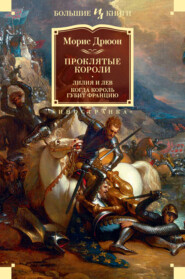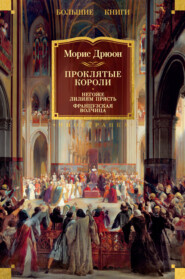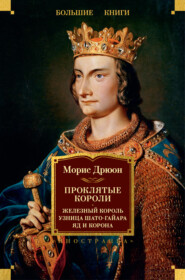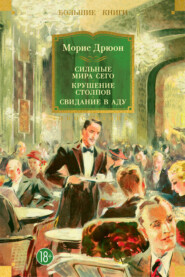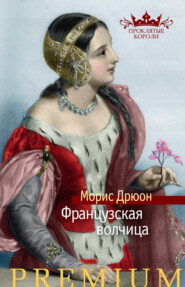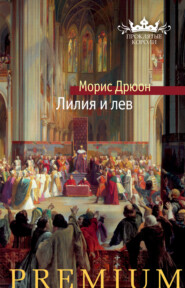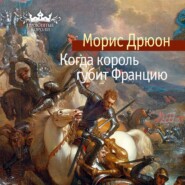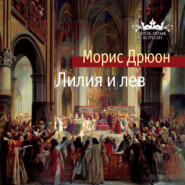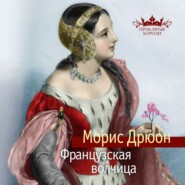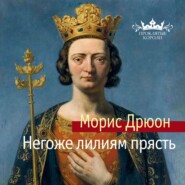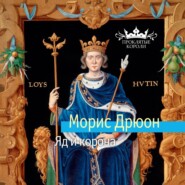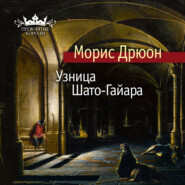По всем вопросам обращайтесь на: info@litportal.ru
(©) 2003-2025.
✖
The King Without a Kingdom
Автор
Год написания книги
2019
Настройки чтения
Размер шрифта
Высота строк
Поля
4. The Banquet (#litres_trial_promo)
5. The Arrest (#litres_trial_promo)
6. The Preparations (#litres_trial_promo)
7. The Field of Forgiveness (#litres_trial_promo)
Part Three: The Lost Spring (#litres_trial_promo)
1. The Hound and the Fox Cub (#litres_trial_promo)
2. The Nation of England (#litres_trial_promo)
3. The Pope and the World (#litres_trial_promo)
Part Four: The Summer of Disaster (#litres_trial_promo)
1. The Norman Chevauchée (#litres_trial_promo)
2. The Siege of Breteuil (#litres_trial_promo)
3. The Homage of Phoebus (#litres_trial_promo)
4. The Camp of Chartres (#litres_trial_promo)
5. The Prince of Aquitaine (#litres_trial_promo)
6. The Cardinal’s Approach (#litres_trial_promo)
7. The Hand of God (#litres_trial_promo)
8. The Battalion of the King (#litres_trial_promo)
9. The Prince’s Supper (#litres_trial_promo)
Translator’s notes and historical explanations (#litres_trial_promo)
By Maurice Druon (#litres_trial_promo)
About the Publisher (#litres_trial_promo)
Foreword (#ulink_8f07458b-6186-574a-8a38-7570a8742e4e)
GEORGE R.R. MARTIN (#ulink_8f07458b-6186-574a-8a38-7570a8742e4e)
Over the years, more than one reviewer has described my fantasy series, A Song of Ice and Fire, as historical fiction about history that never happened, flavoured with a dash of sorcery and spiced with dragons. I take that as a compliment. I have always regarded historical fiction and fantasy as sisters under the skin, two genres separated at birth. My own series draws on both traditions … and while I undoubtedly drew much of my inspiration from Tolkien, Vance, Howard, and the other fantasists who came before me, A Game of Thrones and its sequels were also influenced by the works of great historical novelists like Thomas B. Costain, Mika Waltari, Howard Pyle … and Maurice Druon, the amazing French writer who gave us the The Accursed Kings, seven splendid novels that chronicle the downfall of the Capetian kings and the beginnings of the Hundred Years War.
Druon’s novels have not been easy to find, especially in English translation (and the seventh and final volume was never translated into English at all). The series has twice been made into a television series in France, and both versions are available on DVD … but only in French, undubbed, and without English subtitles. Very frustrating for English speaking Druon fans like me.
The Accursed Kings has it all. Iron kings and strangled queens, battles and betrayals, lies and lust, deception, family rivalries, the curse of the Templars, babies switched at birth, she-wolves, sin, and swords, the doom of a great dynasty … and all of it (well, most of it) straight from the pages of history. And believe me, the Starks and the Lannisters have nothing on the Capets and Plantagenets.
Whether you’re a history buff or a fantasy fan, Druon’s epic will keep you turning pages. This was the original game of thrones. If you like A Song of Ice and Fire, you will love The Accursed Kings.
George R.R. Martin
Author’s Acknowledgements (#ulink_19e0bf28-22d8-568a-817a-788b91a50e19)
I am most grateful to Jacques Suffel for his assistance in gathering and compiling the documentation for this book. I would also like to express my thanks to the Bibliothèque Nationale as well as to the Archives de France.
Family Tree (#ulink_728b111b-5416-5e7e-87ac-9966d7cf166f)
Kingdom of France map (#ulink_3447e678-caed-59a8-80f1-f64a66c26cf2)
Prologue (#ulink_26f861fb-356a-5efc-979c-f2bfb6de4fe4)
HISTORY’S TRAGEDIES REVEAL great men: but those tragedies are provoked by the mediocre.
At the beginning of the fourteenth century, France was the most powerful, the most densely populated, the most dynamic, and the richest of the Christian kingdoms, whose interventions were most feared, whose arbitration was heeded and whose protection was sought after. And one could have thought that a French century was about to take hold across Europe.
How, then, did it happen that this same France forty years later came to be crushed on the battlefield by a nation it outnumbered fivefold? Why should its noblemen be split up into factions, its bourgeoisie in revolt, its people overwhelmed by excessive taxation, its provinces lawless and plagued by roving gangs engaged in pillaging and crime, all authority flouted, the currency weakened, trade at a standstill, and poverty and violence rife everywhere? Why this collapse? What caused this reversal of fortune?
It was mediocrity. The mediocrity of just a few kings, their vanity and self-importance, their frivolousness in the conduct of their affairs, their inability to attract talented advisors, their nonchalance, their presumptuousness, their failure to draw up grand designs or even to follow those already conceived.
Nothing great can be accomplished politically, and nothing can last, without the presence of men whose brilliance, character and determination inspire, rally and channel the energies of a people.
Everything falls apart when weak protagonists succeed one another at the head of the State. Unity breaks down when greatness falls away.
France is an idea that embraces history, a wilful idea, which from almost exactly the year one thousand onwards had a ruling family, the House of Capet, that passed on its rule so stubbornly from father to son that being the first-born male child of the oldest branch fast became legitimacy enough to reign.
Luck certainly played its part, as though fate had wanted to favour this burgeoning nation with a sturdy dynasty. From the election of the first Capetian up until the death of Philip the Fair, France had only eleven kings, in three and a quarter centuries, and each one left a male heir.
Oh! These sovereigns were not all blessed with genius. But the incapable or the unfortunate would so often be succeeded immediately by a monarch of great stature, or a great minister would stand in for the faltering prince and govern in his place, it was as if by the grace of God the dynasty persisted.
The fledgling France almost perished in the hands of Philip I, a man of minor vice and major incompetence. Then came the corpulent but indefatigable Louis VI, who found on his accession a country under threat just five leagues from Paris, and left it restored to its former glory, stretching as far as the Pyrenees. The undecided, inconsistent Louis VII engaged the kingdom in disastrous adventures overseas; but the Abbot Suger maintained the cohesion and activity of the country in the name of the monarch.
And France’s luck, repeatedly, was to have between the end of the twelfth and the beginning of the fourteenth centuries three sovereigns of exceptional talent, each one blessed by a long reign – forty-three years, forty-one years, and twenty-nine years respectively on the throne – so that their main designs could be rendered irreversible. Three men of most different natures and virtues, but all three very much in another league compared to any other king.
Philip II Augustus, master craftsman of history, began to build the unity of his native land literally in stone, building around and beyond the royal possessions. Saint Louis, enlightened by devotion, began to establish the unity of law, building upon royal justice. Philip the Fair, superior statesman, began to lay down the unity of the state, building on royal administration. Not one of them was overly worried about pleasing the people, but more concerned with being both active and effective. Each one of them had to swallow the bitter draught of unpopularity. But they were more sorely missed after their death than they had been disparaged, mocked or hated while they were alive. And above all, what they had strived for came to be.
A country, a judicial system, a state: the defining foundations of a nation. Under these three supreme artisans of the idea of France, the country emerged from the age of potentiality. Self-aware, France was establishing itself in the western world as an indisputable, and soon to be pre-eminent, reality.
With twenty-two million inhabitants, its borders well guarded, an army that could be called up quickly, feudal lords kept at heel, constituencies perfectly controlled, roads safe, trade flourishing; what other Christian country could compare itself to France, and which would not be envious of it? The people complained of course, feeling controlled by a hand they considered too firm; later they would moan a good deal more when delivered up to hands too soft or too deranged.
With the death of Philip the Fair, suddenly the idea of France cracked. The long succession of good fortune was broken.
The three sons of the Iron King followed each other on the throne without leaving male descent. We have previously told the story of the dramas the court of France went through as its crown was repeatedly auctioned to the most ambitious bidder.
Four kings committed to the grave in the space of fourteen years; more than enough to fill minds with dismay! France was not used to rushing to Rheims quite so often. It was as if the Capetian family tree had been struck by lightning in its very trunk. And to see the crown slip into the hands of the Valois branch, the troubled branch, would reassure no one. Ostentatious, impulsive, enormously presumptuous princes, all form and no substance, the Valois imagined that all they had to do was smile to make the kingdom happy. Their predecessors mistook themselves for France itself. They mistook France for the idea they had of themselves. After the curse of rapid demise came the curse of mediocrity.






